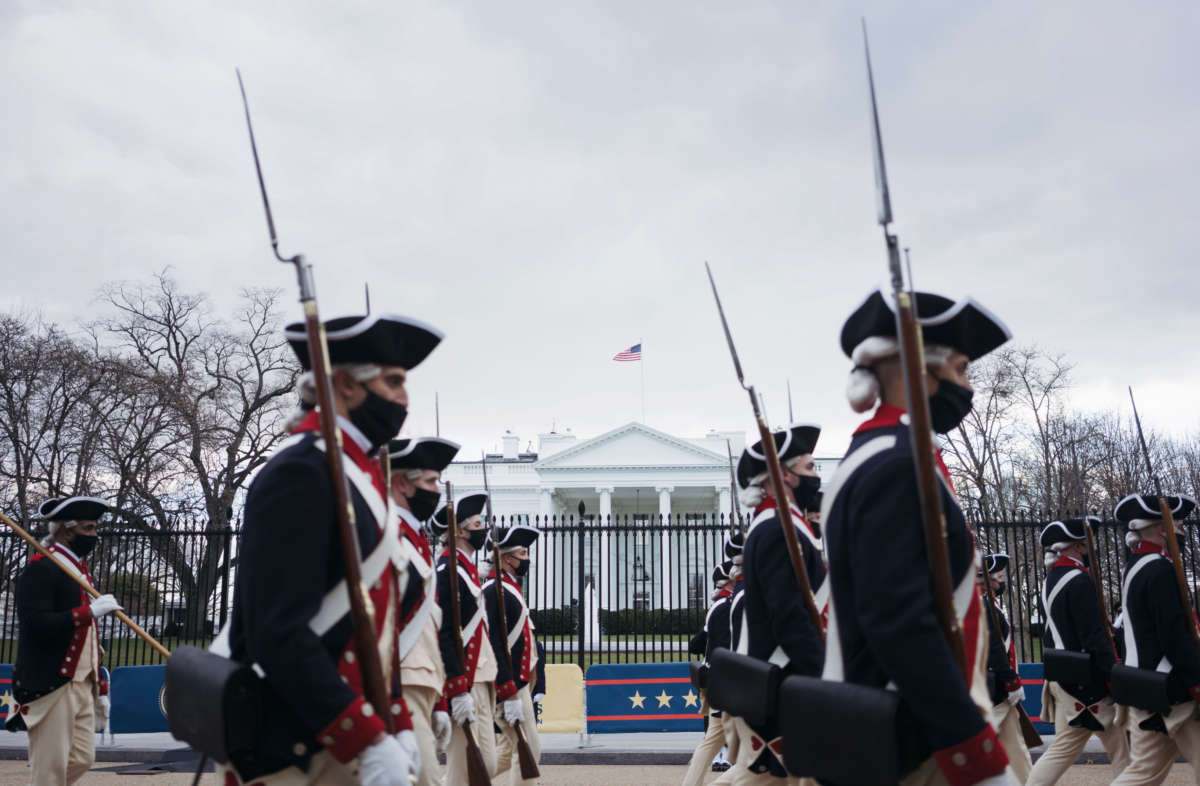Support justice-driven, accurate and transparent news — make a quick donation to Truthout today!
The inauguration of President-elect Joe Biden, set to commence on Wednesday, will be missing one notable aspect that has been part of nearly every inauguration in recent history: the presence of the outgoing president as a sign of the peaceful transfer of power.
President Donald Trump announced in a tweet on January 8 that he would not be attending Biden’s inauguration ceremony. “To all of those who have asked, I will not be going to the Inauguration on January 20th,” Trump wrote, in what became his last social media post on Twitter before he was banned from the platform (due to his issuing a number of tweets that could be viewed as inciting violence).
Upon hearing the news that Trump wouldn’t attend his inauguration, Biden at the time described the decision as “one of the few things he and I have ever agreed on.”
“It’s a good thing, him not showing up,” Biden added.
Yet in spite of those words, Biden’s transition team is attempting to produce a ceremony that will focus on a push for national unity, following a highly contentious election year in which messages filled with vitriol and anger were regularly shared between the candidates.
“The inaugural gives us a fresh start, an ability to begin closing a very dark chapter in our history and start a new journey,” Stephanie Cutter, co-executive producer of Biden’s inauguration, said earlier this month.
Trump’s refusal to take part in the inauguration of his successor is not without precedent, however, although it is extremely rare. With the exception of those who died while in office, only four prior presidents have not attended the inaugural ceremony for their successor.
Richard Nixon, who resigned from office in 1974, left the White House immediately after, opting not to stay for Gerald Ford’s swearing-in ceremony. Before that, the last time a president didn’t attend the inauguration of his successor was more than 100 years ago, when Andrew Johnson skipped the swearing in of Ulysses S. Grant, choosing instead to sign last-minute legislation at the White House while it happened.
John Quincy Adams also skipped Andrew Jackson’s inauguration in 1829. The two had had a bitter presidential election contest, and Adams also refused to invite Jackson to the White House before the inauguration. Earlier, his father, John Adams had also refused to attend Thomas Jefferson’s inauguration in 1801, due to the highly contentious and acrimonious campaign between the two. The transfer of power that year was also the first time the presidency was handed over to a person from an opposing political party.
While some of the presidents who refused to attend the inauguration ceremonies for their successors did so for what appear to be spiteful reasons, Trump is in a class of his own, as his actions between losing the election and Biden’s inauguration resulted in a mob of his loyalists storming the Capitol in an attempt to interfere with the results of the election and the traditional peaceful transfer of power.
Trump is the first president to avoid his successor’s inauguration “after trying to foment a coup so he could stay in power despite losing his reelection campaign,” Salon’s Matthew Rozsa recently pointed out.
Trump’s encouragement of his supporters to take action against Congress on the day of the Electoral College certification vote has led to heightened security in Washington, D.C. Federal authorities aren’t taking any chances, and are now vetting the backgrounds of more than 25,000 National Guard troops attending the event as part of the security detail.
On Tuesday, the Associated Press reported that at least two members of the National Guard had been removed from the security mission due to harboring far-right views and having ties to fringe militia groups.
A terrifying moment. We appeal for your support.
In the last weeks, we have witnessed an authoritarian assault on communities in Minnesota and across the nation.
The need for truthful, grassroots reporting is urgent at this cataclysmic historical moment. Yet, Trump-aligned billionaires and other allies have taken over many legacy media outlets — the culmination of a decades-long campaign to place control of the narrative into the hands of the political right.
We refuse to let Trump’s blatant propaganda machine go unchecked. Untethered to corporate ownership or advertisers, Truthout remains fearless in our reporting and our determination to use journalism as a tool for justice.
But we need your help just to fund our basic expenses. Over 80 percent of Truthout’s funding comes from small individual donations from our community of readers, and over a third of our total budget is supported by recurring monthly donors.
Truthout has launched a fundraiser to add 460 new monthly donors in the next 8 days. Whether you can make a small monthly donation or a larger one-time gift, Truthout only works with your support.
